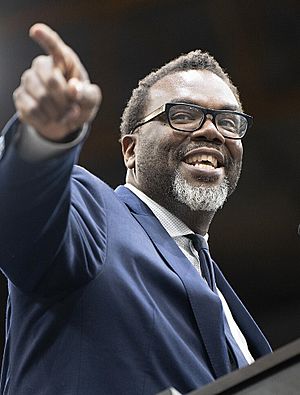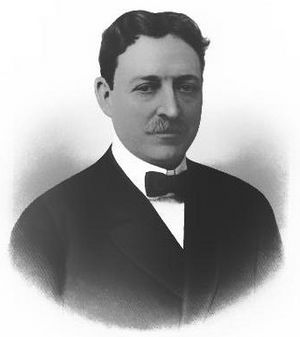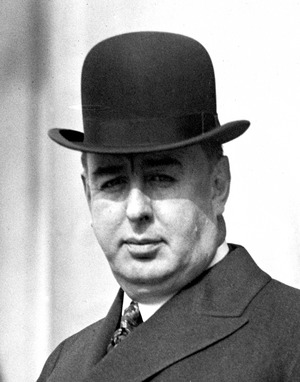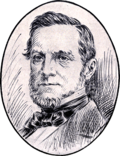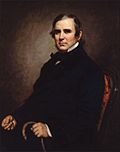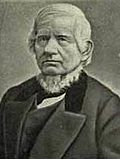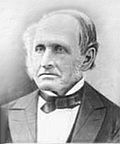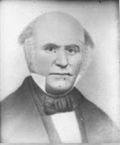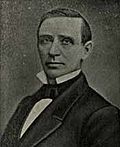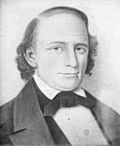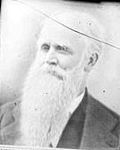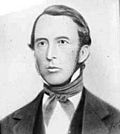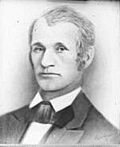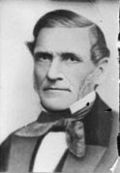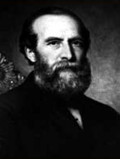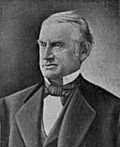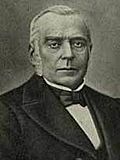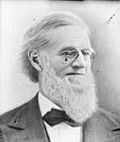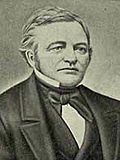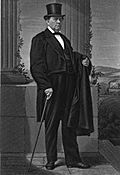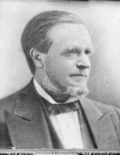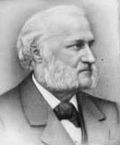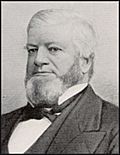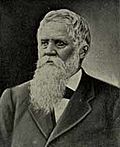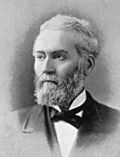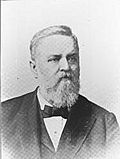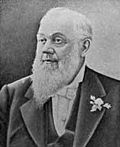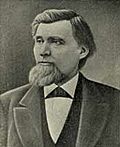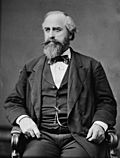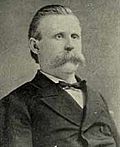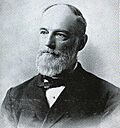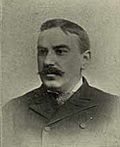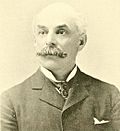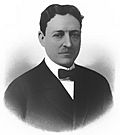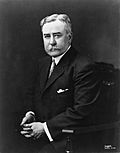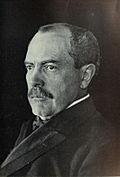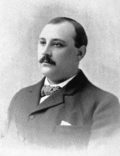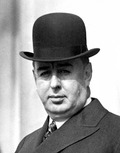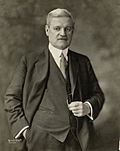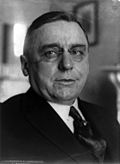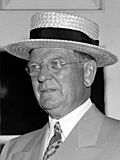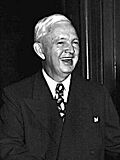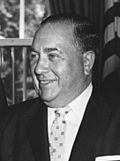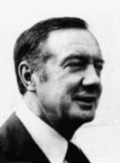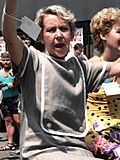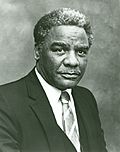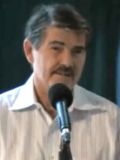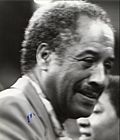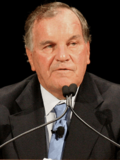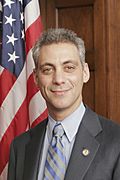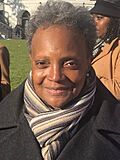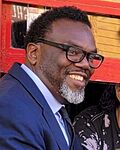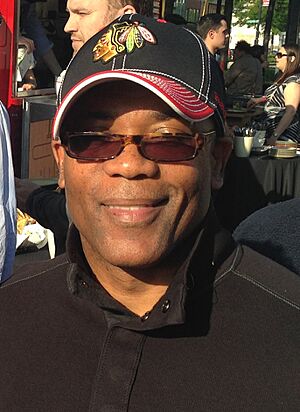Mayor of Chicago facts for kids
Quick facts for kids Mayor of Chicago |
|
|---|---|
| Government of Chicago | |
| Style |
|
| Term length | 4 years |
| Inaugural holder | William B. Ogden |
| Formation | 1837 |
| Salary | $216,210 |
The mayor of Chicago is the main leader of the city government in Chicago, Illinois. Chicago is the third-largest city in the United States. The mayor's job is to run different city departments and make sure the city's rules are followed. They also suggest new ideas to the Chicago City Council and create the city's yearly budget. The mayor also chooses people to lead city departments and join city committees.
When the City Council meets, the mayor leads the meeting. The mayor usually cannot vote on issues. However, they can vote if there is a tie. The role of mayor was created when Chicago became a city in 1837.
Contents
History of Chicago's Mayors
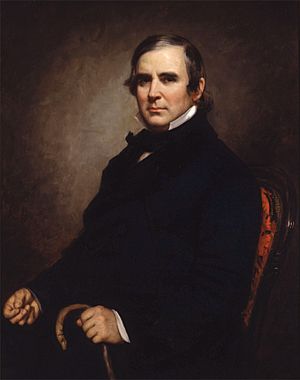
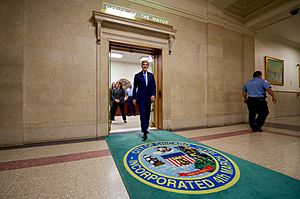
The first mayor of Chicago was William B. Ogden, who served from 1837 to 1838. Since then, 46 men and two women have held the job. The two women mayors were Jane Byrne (1979–1983) and Lori Lightfoot (2019–2023).
Interestingly, two father-and-son pairs have been mayors. They are Carter Harrison III and Carter Harrison IV, and Richard J. Daley and Richard M. Daley. Carter Harrison IV was the first mayor born in Chicago.
David Duvall Orr was an interim mayor for only one week in 1987. This was the shortest time anyone has held the office. Richard M. Daley was elected six times. He served for 22 years, becoming Chicago's longest-serving mayor. He even served longer than his father, who was mayor for 21 years.
The first Irish Catholic mayor was John Patrick Hopkins (1893–1895). Rahm Emanuel (2011–2019) is the only Jewish American to have been mayor.
Harold Washington (1983–1987) was the first African American mayor. Lori Lightfoot was the first African American woman mayor. She was also the first openly LGBT mayor. Brandon Johnson (2023–present) is the fourth African American mayor. Eugene Sawyer was chosen by the council to be mayor after Harold Washington passed away.
Mayor's Power to Appoint Leaders
The mayor chooses the leaders for many important city departments. This includes the commissioner of the Chicago Fire Department and the superintendent of the Chicago Police Department. They also appoint leaders for departments like Water Management and Streets & Sanitation.
The mayor also picks members for the boards of several important city groups. These include the City Colleges of Chicago, Chicago Park District, Chicago Public Library, Chicago Housing Authority, and Chicago Transit Authority. The mayor also appoints the leaders of the Chicago Public Schools.
The Chicago City Clerk, City Treasurer of Chicago, and the 50 alderpersons (who are like city council members) are elected by the public. However, if any of these positions become empty, the mayor can choose someone to fill the spot. If the mayor's office becomes empty, the City Council chooses one of its members to be the acting mayor.
Chicago's government is set up as a "weak-mayor" system. This means the City Council usually has most of the power. But in reality, Chicago's mayor has always been one of the most powerful city leaders in the country. Unlike other "weak-mayor" systems, Chicago's mayor gets to create the city's budget. The mayor's office is sometimes called "the fifth floor" because it is located on the fifth floor of Chicago City Hall. This name shows how much power the mayor has.
How Mayors Are Elected and Replaced
Chicago's mayor is elected by the people every four years. The election happens on the last Tuesday in February. If no candidate gets more than half of the votes, a second election (called a run-off) is held on the first Tuesday in April. These elections are non-partisan, meaning candidates do not run as members of a political party. Chicago is the largest city in the U.S. that does not limit how many terms a mayor can serve.
If the mayor's office becomes empty, or if the mayor cannot serve due to illness, the City Council chooses a vice mayor to be the temporary mayor. This temporary mayor serves until the City Council picks one of its members to be the acting mayor, or until the mayor's term ends.
However, if the mayor's office becomes empty with more than 28 months left in the term, and at least 130 days before the next city election, a special election is held. This special election chooses a new mayor to finish the rest of the term. If there are fewer than 28 months left, or fewer than 130 days before the next election, the acting mayor serves until the term ends.
These rules for replacing a mayor were made clearer after Richard J. Daley passed away while in office. They were used again when Harold Washington passed away, and Vice Mayor David Orr became acting mayor. Before these rules, the laws were unclear.
If the mayor is not at a City Council meeting, the president pro tempore (a council member chosen by the council) leads the meeting. Unlike the mayor, the president pro tempore can vote on all issues. If neither the mayor nor the president pro tempore can lead, the vice mayor steps in.
List of Chicago Mayors
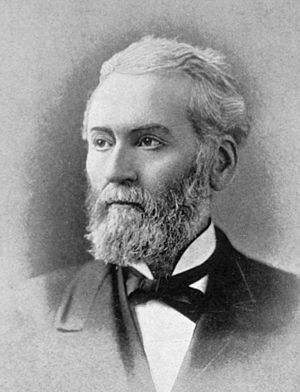
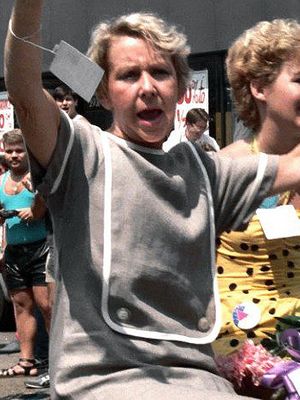
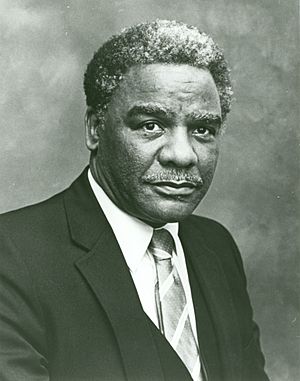
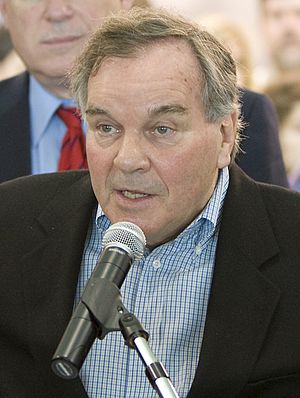
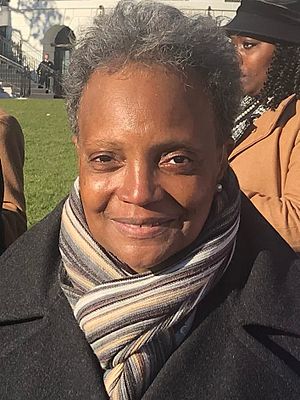
Before 1837, Chicago was a town led by town presidents. Since 1837, it has been a city led by mayors.
The mayor's term was one year from 1837 to 1863. Then it changed to two years. In 1907, it changed again to four years.
| #No. | Image | Name | Term start | Term end | Terms | Years | ||
|---|---|---|---|---|---|---|---|---|
| Town presidents | ||||||||
| 1 | Thomas Jefferson Vance Owen | August 12, 1833 | August 11, 1834 | 1 | 1 | None | ||
| 2 |
|
John H. Kinzie | 1834 | May 1837 | 3 | 3 years | Whig | |
| Mayors | ||||||||
| 1 |
|
William B. Ogden | May 1837 | March 1838 | 1 | 10 months | Democratic | |
| 2 |
|
Buckner S. Morris | 1838 | 1839 | 1 | 1 | Whig | |
| 3 |
|
Benjamin W. Raymond | 1839 | 1840 | 1 | 1 | Whig | |
| 4 |
|
Alexander Loyd | March 9, 1840 | March 4, 1841 | 1 | 1 | Democratic | |
| 5 |
|
Francis C. Sherman | March 4, 1841 | March 7, 1842 | 1 | 1 | Democratic | |
| 6 |
|
Benjamin W. Raymond | March 7, 1842 | March 7, 1843 | 1 | 1 | Whig | |
| 7 |
|
Augustus Garrett | March 7, 1843 | April 2, 1844 | 1 | 1 year,
1 month |
Democratic | |
| 8 |
|
Alson Sherman | April 2, 1844 | March 10, 1845 | 1 | 11 months | Independent Democratic | |
| 9 |
|
Augustus Garrett | March 10, 1845 | March 3, 1846 | 1 | 1 | Democratic | |
| 10 |
|
John P. Chapin | March 3, 1846 | March 9, 1847 | 1 | 1 | Whig | |
| 11 |
|
James Curtiss | March 9, 1847 | March 14, 1848 | 1 | 1 | Democratic | |
| 12 |
|
James H. Woodworth | March 14, 1848 | March 12, 1850 | 2 | 2 | Independent Democratic | |
| 13 |
|
James Curtiss | March 12, 1850 | March 11, 1851 | 1 | 1 | Democratic | |
| 14 |
|
Walter S. Gurnee | March 11, 1851 | March 7, 1853 | 2 | 2 | Democratic | |
| 15 |
|
Charles McNeill Gray | March 7, 1853 | March 15, 1854 | 1 | 1 | Democratic | |
| 16 |
|
Isaac L. Milliken | March 15, 1854 | March 13, 1855 | 1 | 1 | Democratic | |
| 17 |
|
Levi Boone | March 13, 1855 | March 11, 1856 | 1 | 1 | American (Know Nothing) |
|
| 18 |
|
Thomas Dyer | March 11, 1856 | March 10, 1857 | 1 | 1 | Democratic | |
| 19 |
|
John Wentworth | March 10, 1857 | March 2, 1858 | 1 | 1 | Republican | |
| 20 |
|
John C. Haines | March 2, 1858 | March 22, 1860 | 2 | 2 | Republican | |
| 21 |
|
John Wentworth | March 22, 1860 | May 6, 1861 | 1 | 1 year,
1.5 months |
Democratic | |
| 22 |
|
Julian S. Rumsey | May 6, 1861 | May 5, 1862 | 1 | 1 | Republican | |
| 23 |
|
Francis C. Sherman | May 5, 1862 | May 3, 1865 | 2 | 3 | Democratic | |
| 24 |
|
John B. Rice | May 3, 1865 | December 6, 1869 | 2 | 4 years,
6 months |
Republican | |
| 25 |
|
Roswell B. Mason | December 6, 1869 | December 4, 1871 | 1 | 2 | Citizens | |
| 26 |
|
Joseph Medill | December 4, 1871 | August 22, 1873 | 1 | 2 | Republican (Dry) | |
| -- |
|
Lester L. Bond (acting) |
August 22, 1873 | December 1, 1873 | -- | 3 months | Republican | |
| 27 |
|
Harvey Doolittle Colvin | December 1, 1873 | July 24, 1876 | 1 | 2 years,
8 months |
Republican (Wet) | |
| 28 |
|
Monroe Heath | July 24, 1876 | April 28, 1879 | 2 | 2 years,
7 months |
Republican | |
| 29 |
|
Carter Harrison III | April 28, 1879 | April 18, 1887 | 4 | 8 | Democratic | |
| 30 |
|
John A. Roche | April 18, 1887 | April 15, 1889 | 1 | 2 | Republican | |
| 31 |
|
DeWitt C. Cregier | April 15, 1889 | April 27, 1891 | 1 | 2 | Democratic | |
| 32 |
|
Hempstead Washburne | April 27, 1891 | April 17, 1893 | 1 | 2 | Republican | |
| 33 |
|
Carter Harrison III † | April 17, 1893 | October 28, 1893 | 1 | 6 months | Democratic | |
| 34 |
|
George Bell Swift (interim mayor) |
November 9, 1893 | December 27, 1893 | 1⁄12 | 1⁄6 | Republican | |
| 35 |
|
John P. Hopkins | December 27, 1893 | April 8, 1895 | 1 | 1 year,
4 months |
Democratic | |
| 36 |
|
George Bell Swift | April 8, 1895 | April 15, 1897 | 1 | 2 | Republican | |
| 37 |
|
Carter Harrison IV | April 15, 1897 | April 10, 1905 | 4 | 8 | Democratic | |
| 38 |
|
Edward F. Dunne | April 10, 1905 | April 15, 1907 | 1 | 2 | Democratic | |
| 39 |
|
Fred A. Busse | April 15, 1907 | April 17, 1911 | 1 | 4 | Republican | |
| 40 |
|
Carter Harrison IV | April 17, 1911 | April 26, 1915 | 1 | 4 | Democratic | |
| 41 |
|
William H. Thompson | April 26, 1915 | April 16, 1923 | 2 | 8 | Republican | |
| 42 |
|
William E. Dever | April 16, 1923 | April 18, 1927 | 1 | 4 | Democratic | |
| 43 |
|
William H. Thompson | April 18, 1927 | April 9, 1931 | 1 | 4 | Republican | |
| 44 |
|
Anton Cermak † | April 9, 1931 | March 6, 1933 | 1 | 1 year,
11 months |
Democratic | |
| 45 | 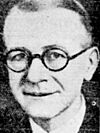 |
Frank J. Corr (acting mayor) |
March 15, 1933 | April 8, 1933 | -- | 24 days | Democratic | |
| 46 |
|
Edward J. Kelly | April 17, 1933 | April 15, 1947 | 3 1⁄12 | 14 | Democratic | |
| 47 |
|
Martin H. Kennelly | April 15, 1947 | April 20, 1955 | 2 | 8 | Democratic | |
| 48 |
|
Richard J. Daley † | April 20, 1955 | December 20, 1976 | 6 | 21 years,
8 months |
Democratic | |
| 49 |
|
Michael A. Bilandic | December 20, 1976 | April 16, 1979 | 1 | 2 years,
4 months |
Democratic | |
| 50 |
|
Jane Byrne | April 16, 1979 | April 29, 1983 | 1 | 4 | Democratic | |
| 51 |
|
Harold Washington † | April 29, 1983 | November 25, 1987 | 2 | 4 years,
7 months |
Democratic | |
| 52 |
|
David Orr (acting mayor) |
November 25, 1987 | December 2, 1987 | -- | 7 days | Democratic | |
| 53 |
|
Eugene Sawyer | December 2, 1987 | April 24, 1989 | 1 | 1 year,
4.5 months |
Democratic | |
| 54 |
|
Richard M. Daley | April 24, 1989 | May 16, 2011 | 6
(5 elected) |
22 years,
1 month |
Democratic1 | |
| 55 |
|
Rahm Emanuel | May 16, 2011 | May 20, 2019 | 2 | 8 | Democratic1 | |
| 56 |
|
Lori Lightfoot | May 20, 2019 | May 15, 2023 | 1 | 4 | Democratic1 | |
| 57 |
|
Brandon Johnson | May 15, 2023 | incumbent | 1 | Democratic1 | ||
† Died/murdered in office.
1 Since 1999, mayoral elections have officially been nonpartisan. A 1995 Illinois law stated that "candidates for mayor ... no longer would run under party labels in Chicago". However, Richard M. Daley, Rahm Emanuel, Lori Lightfoot, and Brandon Johnson are known to be Democrats.
Role of the Vice Mayor
| Vice mayor of Chicago | |
|---|---|
| Inaugural holder | Casey Laskowski |
| Formation | 1976 |
| Salary | $0 |
Illinois law says that the City Council chooses a vice mayor. This person steps in as temporary mayor if the mayor's office is empty. They also serve if the mayor cannot do their job due to illness or injury. The current vice mayor is Walter Burnett.
This position was created after Richard J. Daley passed away while in office. There was a power struggle over who should take over. The vice mayor position helps avoid such problems.
If neither the mayor nor the president pro tempore can lead a City Council meeting, the vice mayor takes charge.
For a long time, the vice mayor's job was mostly symbolic. But in 2023, Mayor Brandon Johnson helped pass a plan that gave the office a $400,000 budget. He also asked his vice mayor, Burnett, to work as an official link between the mayor's office and the community.
List of Vice Mayors
| Vice-Mayor | Tenure | Mayor(s) serve under | Notes | Citations | |
|---|---|---|---|---|---|
| Casey Laskowski | 1976–1979 | Michael Bilandic | |||
| Richard Mell | 1979–1987 | Jane Byrne Harold Washington |
|||
 |
David Orr | 1987–1988 | Harold Washington Eugene Sawyer |
Served as Acting Mayor for 1 week | |
| Terry Gabinski | 1988–1998 | Eugene Sawyer Richard M. Daley |
|||
| Bernard Stone | 1998–2011 | Richard M. Daley | |||
| Ray Suarez | 2011–2015 | Rahm Emanuel | |||
 |
Brendan Reilly | 2015–2019 | Rahm Emanuel | ||
 |
Tom Tunney | 2019–2023 | Lori Lightfoot | ||
 |
Walter Burnett Jr. | 2023–present | Brandon Johnson | ||
See also
 In Spanish: Alcalde de Chicago para niños
In Spanish: Alcalde de Chicago para niños
- Law and government of Chicago
- Timeline of Chicago history


